


The quarterly magazine from CIVEA, the Civil Enforcement Association SPRING 2024 Defining Modern enforcement CIVEA Conference 2024


USING DATA TO DRIVE COLLECTIONS Item 2Item 3Item 4Item 5 PIONEERING ENFORCEMENT: DUKESLIMITED.CO.UK Sarah Naylor, IRRV (Tech) Sales Director 07739205333 snaylor@dukeslimited.co.uk Learn more by contacting Over the last year, we have increased collections for our local authority clients up to 33% by using our award-winning, bespoke route planning and scheduling system, Visit Genius.
CIVEA Conference 2024
defining modern enforcement
On Thursday 18th April 2024, CIVEA, the Civil Enforcement Association, will host a one-day conference, exhibition and awards dinner at De Vere Grand Connaught Rooms, Covent Garden, London.
17
ReachOut: tackling the barriers to engagement
The Money and Pensions Service’ (MaPS) research into ‘The motivations and barriers to seeking debt advice’ , provides a fascinating study into why people don’t engage with debt advice, and why people stop engaging with the advice process.
18 Enforcement Conduct Board news
2024 is well underway and is already shaping up to be an exciting year for the Enforcement Conduct Board. Last year we laid the foundations of our work, which included launching our successful accreditation scheme covering over 95% of the enforcement market in England and Wales.
15 20

19
21 Economic abuse
Economic abuse involves behaviours that interfere with an individual’s ability to acquire, use and maintain economic resources such as money, housing and utilities. It can be controlling or coercive. To have the best outcome for victim-survivors we need a joined-up approach between all creditors within different sectors.
3 CIVEA Civil Enforcement Association • Spring 2024 • ENFORCEMENT NEWS
10
ENFORCEMENT NEWS I SPRING 2024 CONTENTS 13

For more information on our services, contact Andy Cummins on 07841 995 732, email a.cummins@cdergroup.co.uk, or visit www.cdergroup.co.uk Providing effective departments to local and central government enforcement services debt collection and

Where
CIVEA
Russell Hamblin-Boone
COUNCIL LIST
President:
Paul Whyte
Vice President:
Sarah Naylor
Treasurer:
Simon Jacobs
Immediate Past
President: Carole Kenney
Adrian Bates
Amy Collins
Terry Durant
Mike Garland
Deborah Hudson
Andrew Mackay
John Mason
Andy Rose
Martin Stanford
Co-opted members:
Dave Burton
Jason Carter
Dave Chapman
Emma Cowan WSA
1D South
Bond Avenue, Bletchley, Milton Keynes MK1 1SW
Tel: 01908 371177
Email: enfnews@ wsacommunications.co.uk
Call: 01908 371177
It is ten years since the Taking Control of Goods Regulations were implemented and we are marking this at our 2024 conference and annual dinner. The theme this year is Defining Modern Enforcement
The theme is significant because it challenges the definition of our industry that is more commonly portrayed in stereotypes by those ignorant of our work. Recently, we have been the subject of parliamentary inquiries and media reports that have focused exclusively on council tax collection.
This is not surprising because the cost-of-living crisis is a huge issue for policymakers and the media has correspondents assigned to report on all cost-of-living-related stories.
According to CIVEA data, council tax cases accounted for 28% of all enforcement work in 2022. Almost 60% of civil enforcement in 2022 was for the collection of parking and traffic penalty charge notices.
There is an over-emphasis on council tax collection, and we need to do more to explain the huge contribution our sector makes to the nation’s public services and social justice system. According to economists, without the professional and highly skilled use of civil enforcement, the government would have a shortfall of up to £12.4 billion.
We are likely to see a general election this year and CIVEA has already begun engaging with the shadow courts minister. We need to ensure that an incoming government does not concede to emotive campaigns based on anecdotal evidence, which leads to interventions that create long-term detriment to local revenue.
That is why we strongly support the work of the Enforcement Conduct Board (ECB) using comprehensive and substantive evidence to supervise our sector. The ECB has a lot to achieve in the year ahead and we have high expectations for independent evidence-based scrutiny.
As one of its first evidence-gathering exercises, the ECB has chosen to conduct a survey of bodyworn video footage. This is a highly complex and challenging research project that is proving problematic to design with all the necessary protections. However, CIVEA is heavily invested and is working to support the ECB’s objectives.
Arguably more significant for independent monitoring is the quarterly data return that ECBaccredited firms will be required to submit. The detailed metrics are being developed in collaboration with CIVEA members, who have already attended a series of workshops to provide expert advice on the practical and operational implications. The data, as opposed to anecdotes, will be the backbone of the evidence base that the ECB needs for proper oversight.

This will be supplemented by compliance monitoring based on new National Standards, which reflect modern enforcement practices. The ECB and the industry will be liaising with the Ministry of Justice (MOJ) to design and implement new standards with a compliance regime to ensure fair and consistent enforcement.
We expect the MOJ to give serious consideration to the detailed evidence we have presented in response to its consultation of the Taking Control of Goods Regulations. In particular, we need the decision on the changes to the fees structure to be implemented at the start of the next financial year.
The theme of the CIVEA conference this year is Defining Modern Enforcement. The conference programme has been designed to reflect the transformation of our sector over the past ten years and to explore what is needed to meet the challenges of the future.
We have a lineup of experts from within and outside our industry, who will share thoughts and impart advice on topics ranging from the role of technology in smart enforcement and collections to what are the next steps towards professionalising our industry.
We are concluding our conference with a gala dinner, which includes the announcement of the winners of our excellence awards. We launched the awards in 2022 and are building on this with entry categories that are split between large and smaller businesses to ensure fair judgement.
We have added an award for women in enforcement, which recognises CIVEA members’ acknowledgement of the role of our female colleagues at all levels of our business.
There is more to do if we are to be a diverse workforce and CIVEA will be developing plans to improve our sectoral diversity.
Our bi-annual conference is a flagship event, and we are immensely grateful to all our supporters, without whom we could not do this. There are more details in a double-page spread in this edition. We expect huge demand for the free places from those eligible, so book your delegate place early.
I look forward to seeing you at the conference and other events in the year ahead.
Russell Hamblin-Boone CEO, CIVEA
Welcome To ENFORCEMENT NEWS Welcome to the Spring 2024 edition of Enforcement News 5 CIVEA Civil Enforcement Association • Spring 2024 • ENFORCEMENT NEWS Contents+ CEO’s Welcome 5 News & Political Scraps 6 President’s Welcome 7
have all the enforcement agents gone? 9
22
Blog
CEO
House,
ADVERTISING / EDITORIAL
One in three miss payments on vital bills (Money and Pensions Service)
More than 16 million people have missed payments on key household bills this year and over two million did so for the first time, according to new research for Talk Money Week 2023.
• Millions miss payments on key household expenses, some for the first time.
• Credit cards and utilities are the most common bills going unpaid.
• Only two thirds of people would speak to their creditor, while one in seven would decide to do nothing.
A survey of 3,016 UK adults, commissioned by the Money and Pensions Service (MaPS), shows that a third of people (30%) have missed at least one payment in 2023. Of those, 14% said it was the first year this had ever happened.
The data is being released to mark this year’s Talk Money Week (November 6-10), run by MaPS, which is aiming to inspire people to ‘do one thing’ that improves their financial wellbeing.
It reveals that credit card repayments were the most common type that went unpaid (11%), followed by utilities (10%), council tax or rates (10%) and bank overdrafts or loans (8%). One in 20 had missed a rent (5%) or mortgage payment (4%).
Among those who’d missed one before 2023, utilities (28%) and credit card repayments (27%) were again the most common. Council tax or rates (25%), bank overdrafts or loans (23%), rent and mortgage payments (both 14%) were not far behind.
StepChange publishes study on debt advice services
The Personal Finance Research Centre at Bristol University has published, Joined up: Supporting Debt Advice Clients through strong referral partnerships, which presents new evidence about debt advice referrals.
According to the report, most StepChange clients have experienced some sort of referral to another organisation. Three in five (59%) clients have either been inwardly referred to the charity from another organisation or were subsequently referred outwards following their advice session.
Many clients are often referred to multiple different organisations. Of those who were referred by StepChange to another organisation during debt advice, over a quarter (28%) were signposted or referred to three or more different organisations.
Most referrals from StepChange to other organisations were for mental health support, income maximisation or benefits help, abuse-related support, and bereavement support.
Two in five people say their household financial situation will get worse over the next 12 months
According to a YouGov survey for StepChange, more than two in five adults say their household financial situation will get worse over the next 12 months. Of the one in two people worried about their finances, half have cut back on spending on essentials and a quarter (24%) have borrowed money.
Despite so many people experiencing money worries, only 4% of those who said they were worried about their financial situation have sought help from an independent organisation such as StepChange or Citizens Advice.
POLITICAL SCRAPS
Navendu Mishra, Labour, Stockport: To ask the Secretary of State for Levelling Up, Housing and Communities, pursuant to the Answer of 14 December 2023 to Question 6351 on Local Government: Debt Collection, with reference to increases in the cost of living, if his Department will take steps to update the guidance entitled Council tax collection: best practice guidance for local authorities, published on 16 August 2021.
Simon Hoare, Parliamentary Under Secretary of State (Department for Levelling Up, Housing and Communities): “While the Department keeps the guidance on council tax collection under review, there are currently no plans to update it. The Government expects councils to be sympathetic in their approach to collecting council tax, and it is open to them to adopt alternative approaches where they consider it appropriate.”
Navendu Mishra, Labour, Stockport: To ask the Secretary of State for Levelling Up, Housing and Communities, pursuant to the Answer of 14 December 2023 to Question 6351 on Local Government: Debt Collection, if he will take steps to update his Department’s best practice guidance on council tax collection and adopt the Citizens Advice Bureau’s charter on ethical debt collection.
Simon Hoare, Parliamentary Under Secretary of State (Department for Levelling Up, Housing and Communities): “The Department keeps the guidance on council tax collection under review in light of developments in debt collection practice. The collection of council tax is the responsibility of local authorities, and it is open to them to adopt alternative approaches.”
George Howarth, Labour, Knowsley: To ask the Secretary of State for Work and Pensions, if he will make it his policy to amend the eligibility criteria for Cost-of-Living Payments so that people on (a) Housing Benefit and (b) Council Tax Reduction qualify.
Mims Davies The Parliamentary Under-Secretary of State for Work and Pensions: “Eligibility for Council Tax Reduction is determined by local councils and is not a national policy. The eligibility for this support is dependent on a number of factors including where you live and your household income. Low-income households may also be in receipt of a qualifying, income-related means-tested benefit alongside Council Tax Reduction, which could make them eligible for a Cost of Living Payment.”
Rebecca Evans, Labour. Statement by the Minister for Finance and Local Government: Delivering a Fairer Council Tax.
Diolch, Llywydd:
“Our programme for government commits us to reforming council tax to make it fairer, and the co-operation agreement with Plaid Cymru reaffirms that aim. Today, I am launching a phase 2 consultation, which provides an update on our latest work to deliver a fairer council tax for the people of Wales.”
For more news go to the CIVEA website www.civea.co.uk/news-and-media 6 ENFORCEMENT NEWS • Spring 2024 • CIVEA Civil Enforcement Association NEWS in this Quarter
Mixed feelings
As I reflect on the ten years since the Taking Control of Goods Regulations were introduced, I have mixed feelings. There has been constant reform and change for over 30 years. The industry has been on a path of reform since the review of civil enforcement agents in 1992, followed by the seminal Beatson report in 1998.
There is no question that our industry has been transformed under new legislation. The regulations were the catalyst for a reform programme that has included a new independently-monitored code of practice, the establishment of the Compliance, Adjudication and Review of Enforcement (CARE) Panel and the launch of the Enforcement Conduct Board (ECB).
And yet, we continue to spend an inordinate amount of time responding to criticism based on prejudice and ignorance about our work. We seem to be forever explaining misconceptions and correcting misinformation. I appreciate that changing attitudes takes many years and there will never be a welcome for a bailiff! But some of the recent calls for reform are based on a very low level of knowledge and have no evidence that they will lead to better outcomes for debtors.
The most recent examples of this lack of understanding were demonstrated by comments in Parliament.
The House of Commons Levelling Up, Housing and Communities Committee report on Council Tax Collection was only published last December, despite Alistair Townsend and I giving witness evidence to the committee of MPs in June 2022.
From the outset, this was a very politically driven inquiry and the committee members were always going to struggle to come up with any substantive recommendations. Ultimately the report confirmed that council tax collection is efficient and that procedures are set in statute and working well.
The Committee says it is concerned that the threat of enforcement might mean people are putting their council tax payments ahead of heating and eating. It wants to replace the sanction of imprisonment with more suitable deterrents, such as bank arrestment or community service. We have explored this route in the past and it is not straightforward because it would conflate civil and criminal law.
MPs want the Government to direct local authorities to give ‘extra careful consideration’ before using enforcement agents against those in receipt of council tax support and in call cases to demonstrate they have exhausted alternative collection methods before resorting to enforcement agents.
I’m not sure how many councils enforce debts against those on council tax support schemes. I suspect that the Committee hasn’t done its homework on that one.
Among the Committee’s other recommendations are that the government should clarify the provision that requires the unpaid balance to become payable when a payment is missed. This overlooks the fact that local authorities already have the discretion to offer extended repayment plans rather than demanding full payment.
The Committee wants the Government to make the liability order process less burdensome, including by allowing bulk applications, virtual applications, or both, so long as residents remain able to raise objections. Interestingly, this runs counter to the recent judgment by a Swansea judge that the Liability Order should be more specific to each case, with individual Liability Orders.
It also wants to introduce a statutory code of practice on council tax collection, which local authorities would have to regard. It would set out what steps local authorities should take before applying for a Liability Order, including the making of affordable repayment plans.
Ironically, it gives no detail if or how this code would be enforced!
The second incident of MPs commenting on our industry was in January when the Treasury Select Committee took evidence from debt advice providers (Citizens Advice, StepChange, Christians Against Poverty) as part of a short inquiry into debt advice provision. This was an opportunity for the debt advice sector to make an economic and social policy case for additional funding to meet the increased demand for its services during the cost-of-living crisis.
Instead, there was an extended question session on the use of enforcement agents, specifically for the recovery of council tax arrears. StepChange told MPs that there is strong evidence of bailiffs breaking rules, taking goods illegally, not assessing vulnerability or ability to pay and charging excessive fees. It was claimed that only local authorities exempt people on council tax reduction schemes from enforcement action. Apparently, the problem is poor regulation and oversight.
StepChange claims that there is evidence that more ‘humane’ collection by some councils has led to higher collection rates. It was disappointing to hear that, while everyone in our sector has evolved and progressed, the debt advice sector remains stagnated; both in its operations and attitudes.
I personally have been particularly frustrated by the fact that while the ECB is finding its feet and looking to being a positive contribution to the industry, others continue to undermine this positive, forward looking initiative by presenting us with anecdotal challenges.
On a more positive note and in contrast to these outdated attitudes, the CIVEA conference programme is progressive and forward-thinking. We have secured a range of high-quality speakers from within and outside our sector to discuss the shape of modern enforcement.
On the tenth anniversary of the Taking Control of Goods Regulations, it is appropriate that the CIVEA conference recognises the progress made and, more importantly, looks ahead to what we want our industry to look like in the future. We are a comparatively small sector, but we are an essential service to local and central government, especially with the public purse being so tightly squeezed.
With new regulations, industry reform, increased demands from local authorities and independent oversight we have been on a trajectory of improvement and innovation. Working together for the good of the sector we can ensure effective collection with collective oversight. Our conference is an opportunity to showcase the enforcement sector and share best practices.
I look forward to welcoming our delegates.
This will be my last Enforcement News as President before I hand over to Sarah Naylor from Dukes Bailiffs in May. It has been a privilege and, in many ways, an education to hold the CIVEA presidency for the past two years. As I look back over those two years, I can honestly say I have enjoyed the experience. From giving evidence at a Select committee within weeks of taking up the position to the numerous meetings with the Ministry of Justice as we negotiate through the upcoming changes to seeing the ECB bloom into an entity that will bring independent insight into what we do –it has all been a rewarding experience. I would take a moment here to thank Russell, our CEO, who works fastidiously behind the scenes to make the role of president as smooth as possible. His help has been much appreciated by me and I’m sure will also be by Sarah.
As I have highlighted in my comments above, we are stronger together and can achieve so much more through collaboration.
I am grateful to my fellow CIVEA members, especially the Executive Council and I wish Sarah well for her presidency.
 Paul Whyte President, CIVEA
Paul Whyte President, CIVEA
7 CIVEA Civil Enforcement Association • Spring 2024 • ENFORCEMENT NEWS
PRESIDENT ’s Welcome



qualifi ed to the highest standards. With our commitment to fairness and recognising vulnerability early, our professionals act as part of your team, working to respond to your precise needs and achieving maximum recoveries together.
rundles.org.uk | acollins@rundles.org.uk

01/02/24 8 ENFORCEMENT NEWS • Spring 2024 • CIVEA Civil Enforcement Association
Where have all the enforcement agents gone?
CIVEA has highlighted that the number of enforcement agents on the Ministry of Justice (MOJ) Certificated Bailiff Register fell by 33% between August 2017 (2,466) and January 2023 (1,644). This was largely due to the pandemic, but given the numbers are showing no signs of recovery (January 2024 = 1,617) there appears to be a fundamental shift taking place within the enforcement sector.
The role has changed significantly since the introduction of the 2014 regulations, which fixed enforcement fees and made Taking Control of Goods qualifications mandatory. There was a move away from the traditional “can’t pay, we’ll take it away” model, towards recruitment of individuals who could think on their feet and negotiate with debtors to obtain payment, and successful agents were rewarded well under the new fee structure. Then came the pandemic and income from enforcement visits disappeared overnight. Most agents were either self-employed or employed on low basic/high bonus contracts, and with not enough money coming in, many were forced to find work in other sectors.
During months of lockdowns and government restrictions companies were forced to adapt their approach and telephone collection became the norm. The sector invested heavily in new technology to increase remote contact and early-stage collection improved significantly. When restrictions were finally lifted councils were nervous about resuming enforcement agent (EA) visits, and companies therefore continued to develop their office-based collection model.
Whilst the volume of instructions today has largely returned to pre-pandemic levels and the hold on enforcement visits has been fully lifted, the enforcement agents who left have not returned. This may be partly due to the Government’s failure to apply any
inflationary uplift to the 2014 fees, making EA wages comparably less attractive to other sectors. Many enforcement firms have also been slow to attract new EAs, preferring to focus on increasing collection using ‘cheaper’ office-based staff. Given the shortage of EAs, visiting is often limited with cases returning swiftly to the office to be pursued remotely.
Generally, the shift to collect more from the office without the need for an enforcement visit is a positive change, but there are dangers in moving too far down this route! If enforcement companies are just seen as office-based debt collectors who may occasionally visit to leave a letter, is there any reason for the sector to be treated any differently from the rest of the debt collection industry? If physical visits become the exception rather than the norm, how many debtors will avoid payment when they are fully able to discharge their debts? What value do we place on the experience of the enforcement agent on the doorstep in identifying when something just doesn’t feel right?
If we want to maintain the professionalism of our industry, we must do more to attract, recruit and train a new core of enforcement agents to support a modern end-to-end enforcement model.

Recycled Case Specialist
Closed Accounts/Write Offs
Hambury Tilmond
Collecting the Uncollectable



We are a leading provider of Enforcement services, for the collection of Council Tax and NNDR cases, previously returned as uncollectable. Our audited collection rate exceed 20% on recycled Council Tax cases with zero upheld complaints, and we can provide a balanced and ethical solution to increasing your collection rates.
Council Tax and NNDR
#1 Enforcement Agency (measured by value) for the collection of Council Tax and NNDR in over 90% of LA’s where more than one Enforcement Agency has been appointed.
Parking
We’re more than just ANPR. Increasing collection rates through intelligence and door step collections, recycled Warrant service available.
Challenge Us
Send your aged debt securely to Hambury Tilmond for a free/no obligation evaluation. We’ll cleanse, trace, contact append and financially profile your debt portfolio and provide a projected revenue report.
HBOP and Sundry Debts
We have an audited collection rate in excess of 50%. If your HBOP and Sundry Debt is being collected as an ‘added value service’ it’s unlikely collections are being maximised, we have the solution.
Balanced Ethical Collections
Our agents are well trained, only work for Hambury Tilmond, and ethically renumerated, ensuring ethical collections are at the core of what we do. We are proud of our record of zero upheld complaints, and zero complaints to clients since 2018.
We enjoy a challenge, on a trial basis under a simple SLA you can appoint us to challenge your incumbent enforcement provider. We have a proven track record of outperforming incumbent providers with cases they have previously returned as ‘uncollectable’.
90 London Road, Southend
HAMBURY TILMOND www.hamburytilmond.co.uk
on Sea, Essex, SS1 1PG 01702 436032 | info@hamburytilmond.co.uk
Adrian Bates Senior Business Consultant Hambury Tilmond Limited
Defining Modern
On Thursday 18th April 2024, CIVEA, the Civil Enforcement Association, will host a one-day conference, exhibition and awards dinner at De Vere Grand Connaught Rooms, Covent Garden, London.
The bi-annual CIVEA conference is the only event dedicated to the work of civil enforcement agents and has become a flagship event, bringing together industry, public bodies, regulators and the third sector.
The civil enforcement industry has faced significant challenges as it responds to the post-pandemic economy. Ten years on since the Taking Control of Goods Regulations were implemented, this conference will consider the impact of the changes on operations and discuss how the industry must innovate to meet the public sector debt recovery.
For anyone whose professional responsibilities include, or relate to, the collection of council tax, business rates or traffic management, this conference is a must, to understand the content, effects and broader implications of a post-pandemic economy.
To book a free place at the event, please go to www.civeaconference.org. We expect high interest in this event, so please book early to guarantee your place.

THE CONFERENCE PROGRAMME
On the tenth anniversary of the Taking Control of Goods Regulations, the CIVEA conference will reflect on the progress made and, more importantly, look ahead to what we want our industry to look like in the future.
With new regulations, industry reform, increased demands from local authorities and independent oversight we have been on a trajectory of improvement and innovation. Working together for the good of the sector we can ensure effective collection with collective oversight. Our conference is an opportunity to showcase the enforcement sector and share best practices.
Panel 1
The impact of technology on collections and vulnerability
Chair, Carole Kenney – CDER Group
Panellists:
• Nick Rowe – IRRV and Ealing Borough Council
• Darren Kelk – Ascendant Solutions
• Vanessa Northam – StepChange
• Darren Smith – Liberata
This session will highlight the development of technology solutions that has become integral to modern enforcement.
Panel 2
Data is the key to unlock Smart Enforcement
Chair, John Mason – Trace Enforcement
Panellists:
• Jade Neville – Conduent Transportation
• Duncan Baxter – Destin
• Dan Pearce – TelSolutions
• Alan Wood – NPED
This session will discuss how data is being used in modern enforcement and predict how it will support enforcement action in the future.
Panel 3
Preparing for Independent Supervision
Chair, Sarah Naylor – Dukes Bailiffs
Panellists:
• Chris Nichols – Enforcement Conduct Board
• Caroline Wells – CARE Panel member and independent consultant
• Joseph Surtees – HM Treasury (TBC)
• Anna Roughley – Lending Standards Board
This session will discuss industry oversight and consider best practices from other sectors.
Panel 4
Beyond the ECB: Professionalising our sector
Chair, Amy Collins – Rundles
Panellists:
• Sue Chapple – CICM
• Deven Ghelani – Policy in Practice
• Muna Yassin – Rooted Finance
This session will discuss what are the challenges for the enforcement industry that is seeking recognition as a skilled profession.
– –CIVEA CONFERENCE 2024 10 ENFORCEMENT NEWS • Spring 2024 • CIVEA Civil Enforcement Association
Modern enforcement
CIVEA GALA DINNER AND EXCELLENCE AWARDS 2024
The CIVEA gala dinner and excellence awards will follow the one-day conference.
The awards will showcase the best practices in the enforcement sector and spotlight exceptional performance.
The judges are keen to hear about forward-thinking, marketleading vision, or superior service standards that you bring to enhance the civil enforcement profession. They seek to reward exceptional outcomes that benefit local communities, especially in a post-pandemic environment.
An overview of the categories can be found below. Full entry details can be downloaded under each category.
Entry Terms
• This year there are no restrictions on the number of categories that can be entered.
• We have split each category into two parts for larger and smaller firms. This means that firms will be judged against similar entrants.
• Sponsors will have the opportunity to present an award but will not be allowed to enter the category they are presenting.
• Completed forms must be sent to admin@civea.co.uk by 5pm, 29th February 2024. A follow-up email will be received to confirm safe receipt. If this is not received within two working days, please contact us.
• Finalists will be announced on 18th March.
The Judges
A team of experts with knowledge of our industry and experience from other sectors will review the entries.
• Peter Wallwork, Non-Executive Director –Trustfolio
• Robert Thompson, Chairman – Civil Court Users Association
• Dave Pickering, Compliance – Adjudication and Review of Enforcement Panel
• Claire Aynsley, Head of Membership & Compliance – Credit Services Association
• Paul Bowden, Partner – Wilkin Chapman LLP
• Kevin Shaw, Senior Creditor Strategy Manager – Money & Pensions Service
AWARD CATEGORIES
Local authority partnership (Road Traffic) – (large firms)
Local authority partnership (Road Traffic) – (small firms)
Local authority partnership (Revenues) – (large firms)
Local authority partnership (Revenues) – (small firms)
Innovation in enforcement (large firms)
Innovation in enforcement (small firms)
Best vulnerable support (large firms)
Best vulnerable support initiative (small firms)
Training and development (large firms)
Training and development (small firms)
Outstanding Enforcement Agent
Women in Enforcement*
(*New to the awards programme, this is an open category for women working in the industry or related private or public sectors, who has made a significant contribution to enhance the role of women in the civil enforcement sector.)
11 CIVEA Civil Enforcement Association • Spring 2024 • ENFORCEMENT NEWS





FINANCIAL INSIGHT - a unique data platform for financially profiling debtors TRACE SERVICES - low cost, quick turnaround, fully automated service SINGLE VIEW OF DEBT - detailed debt analysis and reporting Tel: 01772 842092 Email: info@destin.co.uk www.destin.co.uk UNLOCKING DATA TO DRIVE BETTER OUTCOMES Advert.qxp_Layout 1 01/02/2024 11:32 Page 1 12 ENFORCEMENT NEWS • Spring 2024 • CIVEA Civil Enforcement Association “We are so pleased with the revenue generated from a batch of cases that was due to be written off, we also wish to thank you for the sensitivity shown to the customers achieving these collections with zero complaints received” Royal Borough of Kensington & Chelsea Get your free no obligation Income Projection Report today contact: Karl Smith Email: karl@whyte.co.uk Direct Line: 01322 661747 Mobile: 07973 113649 Are those non-performing liability orders going to be written off - £££’s lost down the drain? How to increase revenue for vital services without complaint in 4 simple steps: These 4 simple steps Guarantee you will collect – with zero complaints 1 Confidential Consultancy Send them securely to Whyte & Co 2 Evaluation and Planning We will cleanse and score them, placing them in a bespoke process flow and provide you with a Free Income Projection Report detailing what income you can expect from your portfolio 3 Service Level Agreement Simple SLA drawn up to proceed with recovering your revenue 4 Recovered Revenue Creating a predictable revenue stream Have you got aged liability orders awaiting write off? Collection and Increased Revenue is in your hands Proven award-winning system to collect aged non-performing debt…. £ WINNER 2020 Global 100 Unpaid Money Orders 210x146.indd 1 04/05/2022 15:00
Dukes bailiffs implement award-winning AI-based visit scheduling solution
Founded over thirty years ago, Dukes Bailiffs is a privately owned, family-run Enforcement Agency. With over 80 employees, approximately 80% of their business focuses on the collection of Council Tax, Business Rates, Parking Charge Notices and Sundry Debt within Local Authorities. Collecting in the region of £30 million worth of debt in the last year alone, the company are committed to delivering greater social value through carbon footprint reduction and ethical collection practices.
Their Enforcement Team consists of a Head of Enforcement, supported by two Enforcement Managers and four Senior Agents who have day-to-day contact with Agents. This is supported by an Allocations team, responsible for allocating work out to Agents.
Scheduling enforcement visits
In the past Enforcement visits were typically scheduled with Administrators spending time manually allocating cases using postcodes, and Agents spending up to an hour each day route planning for the following day. As well as being an inefficient use of Agent and Administrator time, there was no mechanism in place to ensure repeat visits were made at different times of the day to try and improve the chances of achieving a successful visit outcome.
Innovation
As a company committed to investing in technology and continually improving and innovating, Dukes knew that there had to be a better way to schedule visits and optimise their resources. Following ongoing discussions with long-term technology partner Destin Solutions, a visit scheduling and routing system which Dukes has branded Visit Genius, was developed.
Artificial Intelligence
Visit Genius was built from the ground up and uses machine learning, algorithms, mapping technology and data from multiple sources to automatically inform the best schedule and route for Agents. Using Artificial Intelligence, it can automatically prioritise customers who have not been visited within a certain time frame and ensure Agents make visits within an optimal time block when a debtor is more likely to be present.
Ricky Baker, Head of Enforcement at Dukes Bailiffs, goes on to comment “We essentially wanted a system that would take away the need for Agents to plan and optimise their own routes. We wanted to make it as effective as possible not just in terms of travel times but trying to ensure debtors would be in when our Agents called round. We didn’t want to be in a situation where we were returning cases to our clients where three out of the four visits our Agents did with a specific debtor, were all at a similar time of day.”
Improving productivity
Dukes spent a lot of time collaborating with Destin to scope out the requirements of what was needed ensuring that the system supported their unique and high standards for practicing ethical enforcement activity. Dukes now have a system that makes each visit far more productive by staggering the times of visits. Furthermore, it allows the Agents to plan their visits for the week rather than a single day. Scheduling visits over a longer time period gives the technology more data to work with, helping it to overcome potential issues. For example, cases typically change over time, Agents may get caught up on calls and plans may need to be rescheduled. The more information Visit Genius has to work with, the more it learns and automates the process of rescheduling in the most logical way.
Ricky goes on to comment “Having implemented Visit Genius we are seeing an increase in visits and as a result, an increase in collections. These are our two main KPI’s and it’s great for our clients to see we have the capability to turn more cases around without impacting the quality of our work, we are able to maintain our standards whilst getting more collections on their behalf as a result.”
Integration and reporting
Visit Genius also integrates with the Civica Collect debt recovery system, automatically updating Civica Collect with outcomes achieved using Visit Genius. It also comes with in-depth reporting capabilities so management can see at a glance, a breakdown of what Agents are doing. For example, hours completed by Agents, how many visits have been agreed or postponed, how many visits are completed during the day and the start and finish times of Agents. This all helps with predicting work time on caseloads as well as providing a comprehensive management reporting tool to help manage staff performance and benchmark any best practices.
Award-Winning Technology
Both Dukes Bailiffs and Destin Solutions have been recognised for their work on this project winning the ‘Digital Business Transformation’ award in the 2023 Credit & Collections Technology Awards. As part of the submission, Dukes identified that since implementing Visit Genius they have achieved an increase in monthly average visits of 144% through strategic routing. In addition, they have recorded a 100% reduction in ‘unlocatable’ cases by identifying hard-to-find properties such as caravan sites.
It has also helped boost Dukes’ green credentials by reducing Agents’ fuel costs and carbon footprint thanks to their ability to now schedule visits in a more focused and logical way. Following implementation, Dukes have achieved a 14% reduction in fuel costs despite there being a 26% increase in the number of Agents they employ.

Conclusion
Ricky goes on to conclude “Working with Destin Solutions has been really good, they really know their stuff when it comes to data and coding. They have been one of the most responsive companies we have ever worked with and it’s great to work with people who can take your ideas, expand on them and make really helpful suggestions on how to take things to the next level.”
The solution continues to evolve and plans for future development include the integration of Waze, a sat nav tool that incorporates real-time traffic updates, so that Agents can use Visit Genius as a navigational tool as well as a visit scheduling and routing solution.
 Tracy McAvoy Marketing & Operations Director Destin Solutions
Tracy McAvoy Marketing & Operations Director Destin Solutions
13 CIVEA Civil Enforcement Association • Spring 2024 • ENFORCEMENT NEWS
Stands
IRRV CONFERENCES AND EXHIBITIONS 2024
Vicki Chastney / Kate Lizio
0207 691 8979 / 0207 691 8973
sales@irrv.org.uk
Contact:
Tel:
Email:
and sponsorships
are selling fast, have you booked yet?
our 2023/24 media pack at:
SPRING CONFERENCE & EXHIBITION 2024 Stadium MK, Milton Keynes, 16 & 17 May SCOTTISH CONFERENCE & EXHIBITION 2024 Crowne Plaza, Glasgow, 4 & 5 September ANNUAL CONFERENCE, AWARDS & EXHIBITION 2024
International Centre, Telford, 8, 9 & 10 October
Further details can be found at: https://irrv.net/homenew/page.php?wid=39 Download
https://irrv.net/mediapack
Telford
Supporting vulnerable people through compassionate Enforcement
It is not surprising that people struggling with their mental health are more likely to fall into debt. Other difficult life events or problems such as serious and long-term illness or abusive relationships can often trigger or worsen mental health problems and ultimately impact personal finances.
Civil enforcement is a highly sensitive and challenging job. During these difficult times, contact centres and enforcement agents in the field are very often faced with difficult cases involving people who are facing a whole range of personal problems.
It’s challenging to navigate diverse circumstances and vast, dynamic support landscapes. While agents can lend a sympathetic ear or signpost to debt advice agencies, they may feel helpless and unable to offer any other practical assistance – as it’s difficult to know where to signpost to. For frontline staff, these conversations can be emotionally difficult and stressful to deal with.
Without the tools to support people in need, agents might skim over these problems. Or they might offer personal advice which could be unhelpful and potentially risk worsening the situation.
11.8 million people in the UK struggle to find help when faced with life challenges and two in five (40%) will delay or give up looking because of this (Censuswide, 2020).
How can you consistently support your vulnerable people and staff?
Social enterprise, National Support Network, has created a comprehensive online signposting tool called Support Hub. It helps your agents and people their interacting with to find support that’s right for them. It’s a directory containing information on thousands


Support Hub is National Support Network’s online directory containing carefully-curated information on thousands

Order your unique co-branded Support Hub site to support your
of external support services including helplines, self-help resources, and support groups for any personal challenge or life event.
Unlike directories or lists maintained in-house, Support Hub offers a broad pathway which is continually updated – a safety net for everyone regardless of the problem they’re facing.
Not only does Support Hub offer a safety net for people in need and make conversations a little bit more personal and thoughtful, but it can also foster a deeper connection between staff and your brand’s purpose – confident, motivated and equipped to support customers in need.
With the added benefit of analytics, enforcement agents can also monitor and report the impact of this solution in supporting vulnerable customers.
For more information please visit nsn.org.uk or email info@nsn.org.uk

Cat Divers
Founder and CEO
National Support Network


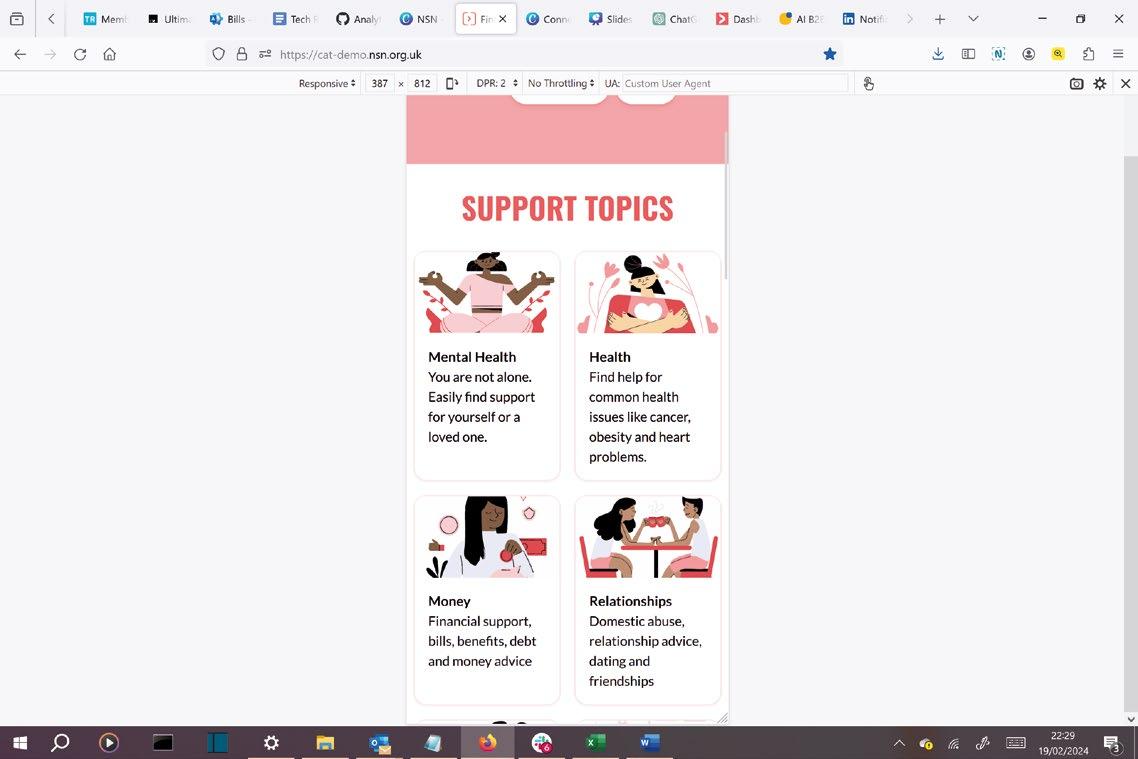
Free trial: nsn.org.uk/trial HIGH-QUALITY, SAFE, AND HOLISTIC SIGNPOSTING VETTED HOLISTIC OPTIONS EQUIPPING AGENTS TO SUPPORT VULNERABLE CUSTOMERS
of
SUPPORT HUB
external services.
customers and staff.



equita.co.uk rossandroberts.co.uk stirlingpark.co.uk Unified, we leverage our rich heritage, while embodying progressive, future-facing enforcement. 1419_Omexus - CIVEA advert S2 AW.indd 1 03/11/2023 15:26 An award winning service to address the dual challenge of low engagement and low awareness of available support. Our clients understand the benefit of customers in debt speaking with someone who can help, even if it’s not them; that’s why they ask us to ReachOut to their non-responsive customers. Visit sigmaconnected.com/reachout Engage Share Empower Promote Connect Explore
ReachOut: tackling the barriers to engagement
The Money and Pensions Service’ (MaPS) research into ‘The motivations and barriers to seeking debt advice’, provides a fascinating study into why people don’t engage with debt advice, and why people stop engaging with the advice process. It gives a detailed breakdown of the following 11 barriers:
1. People feel embarrassed and shameful
2. People find it too overwhelming
3. Low (financial) literacy and confidence
4. Debt is not always the priority problem
5. People do not identify with their debt problem
6. People think short term fixes work
7. People are not sure where to turn
8. People misunderstand what debt advice is
9. People think they’ll lose more than gain
10. People cannot share all the information
11. People want to do it their way
At ReachOut we hear daily examples of people who have found themselves at each of these barriers listed.
The report is a stark reminder that if we are to provide longterm and sustainable solutions for those in need, it is essential that we effectively communicate the help available, tackle the misconceptions of how debt advice works, and help customers to ‘buy in’ to the process.
Overwhelmed...
For many, the driving factor in seeking advice is following interactions with their creditors, whether that be a knock at the door from an enforcement agent or the calls and letters they receive. When they do engage with a service, MaPS’ research found that 22% of participants disengaged because they were overwhelmed by the process.
“We noticed that while people are sometimes forced to confront the situation due to a creditor contacting them or a major event, this can be incredibly overwhelming and they may not have the energy to maintain engagement, reverting to avoidance and denial after finding a short-term fix.”
The Money and Pensions Service, ‘The motivations and barriers to seeking debt advice’
Through our own service we know that those in debt are less likely to engage with their creditors for fear of the consequences of their debt. If they do engage, it can sometimes be to make a payment they can’t afford, to simply buy some time.
Without meaningful and positive engagement with customers, that doesn’t focus solely on debt, it’s hard for creditors to raise awareness of the help available and to communicate in a way that eases customers into the process.
As an early engagement triage service, our role at ReachOut is to connect with our clients’ customers and to promote the support that’s available to them, either directly from the client, or through third party charities, like our partners in debt advice.
Our recent work with Folkestone & Hythe District Council (FHDC) saw us having meaningful and productive conversations with 33% of their residents struggling with council tax arrears (pre-summons). We promoted the support FHDC had made available to residents, including benefits advice, discretionary payments, help with household essentials (the list goes on) and the help available through third-party debt advice.
Our goal was to create an impartial and confidential environment where residents felt safe to be honest and open, so we could discuss all their debt in the context of their wider circumstances and identify the right level of holistic support that would have a lasting impact.
“ReachOut have enabled us to start conversations with residents that we had previously been unable to liaise with. This has enabled us to offer further support to more low-income households using the support and advice available to us.”
Andrew Hatcher, Revenues and Benefits Lead Specialist, Folkestone & Hythe District Council
...and not sure where to turn
With multiple providers of free debt advice, offering very different services through various channels, it can be overwhelming for those accessing debt advice for the first time.
“People are not sure where to turn to or what is available for them. There isn’t enough information on how debt advice works and who it is for.”
The Money and Pensions Service, ‘The motivations and barriers to seeking debt advice’
Our approach to this challenge has been to make it as simple as possible for the customer. Having already explored their wider circumstances, we then spend time talking through the different services most appropriate for them, how they work, and what the customer can expect of the process. We’re not simply signposting the customer to one provider with the bare minimum of information; we’re simplifying the market, managing the customer’s expectations and encouraging them to buy into the process, rather than it being a reluctant course of action for the customer. We also inform our clients of which services we’ve referred customers to, so there is greater transparency between all parties.
MaPS report recommendation: “Create more pre-advice touchpoints to help people realise their situation.”
The MaPS report ends on a series of recommendations, one of which is to create more pre-advice touchpoints to help people realise the reality of their situation.
Through ReachOut our clients create positive interactions with their customers before debts escalate and before the situation becomes truly overwhelming. ReachOut can promote debt advice in a way that motivates customers to fully engage with the services they need and to give them the confidence they need to speak with their creditors.
If you are interested in hearing more about ReachOut please get in touch. We want to help you reach your residents most in need of your support.
jonathan.shaw@sigmaconnected.com
https://www.linkedin.com/in/ jonathan-shaw-2872a2170/

17 CIVEA Civil Enforcement Association • Spring 2024 • ENFORCEMENT NEWS
Connected
Jonathan Shaw ReachOut Partnerships Manager Sigma
Enforcement Conduct Board news
2024 is well underway and is already shaping up to be an exciting year for the Enforcement Conduct Board (ECB). Last year we laid the foundations of our work, which included launching our successful accreditation scheme covering over 95% of the enforcement market in England and Wales.
We now plan to capitalise on this promising start by developing our new standards and code of practice for enforcement agents, which will build on the current National Standards (NS) owned by the Ministry of Justice (MOJ).
The NS have been an important tool for the industry. But at nearly ten years old, they need updating, particularly in reference to key issues such as vulnerability and affordability.
Our standards will be ambitious, placing specific requirements on enforcement firms as well as agents, in recognition of the vital role they play in ensuring the fair treatment of the individual experiencing enforcement.
It is our intention that these new standards will replace the current NS and we are working with the MOJ to ensure that enforcement agents and firms have one set of clear guidance to follow during the enforcement process.
We are aiming to launch the new standards in Autumn 2024. Ahead of their launch, we will consult widely on their content to ensure we hear from as many people as possible who will be impacted.
There will be plenty of opportunities to get involved in the consultation – submitting a written consultation response; joining one of our workshops or webinars that are open to all enforcement agents and other stakeholder groups; or sharing your suggestions informally via contact@enforcementconductboard.org

Details of opportunities to get involved will be published on our website and social media in the coming months, so please do keep an eye out for further information and I hope that many of you will sign up for events.
The ECB was set up to ensure all those experiencing enforcement action are treated fairly, and the appropriate and timely handling of complaints is crucial to this mission. For this reason, another 2024 key priority is the development of our complaints-handling function , which we expect to go live by the start of 2025.
Our complaints process will be easy to navigate and will also offer a consistent, independent, route on complaints for those who feel they have been treated unfairly through the enforcement process and who do not believe their issue has been resolved by the firm handling their case.
If you would like more information on any of these projects, then please do head over to our website where you will find further background and details. You can also email us at the address opposite.
Until next time!
 Chris Nichols Chief Executive Enforcement Conduct Board
Chris Nichols Chief Executive Enforcement Conduct Board

18 ENFORCEMENT NEWS • Spring 2024 • CIVEA Civil Enforcement Association
Enhancing the communication of debt: The power of the Plain Numbers Approach
Vulnerability plays an integral role in the enforcement business, yet one key customer of vulnerability is often overlooked: poor numeracy.
When it comes to enforcement, understanding the numbers is central to positive outcomes. Many firms have put in a lot of effort to make their words more effective, yet in most communications, it is the numbers that are at the core of the message. The Plain Numbers Approach addresses this core issue and in doing so enables
customers to really understand the information that is most important to them.
As shown below, contrary to the common opinion, poor numeracy is the most common vulnerability of those included in research conducted by the FCA back in 2015. It may be surprising for some to find that there are over three times as many people who struggle with numbers compared to those who struggle with words, with the definition used here being the level expected of a primary school child.
The numbers on numeracy, literacy, and other customer vulnerabilities
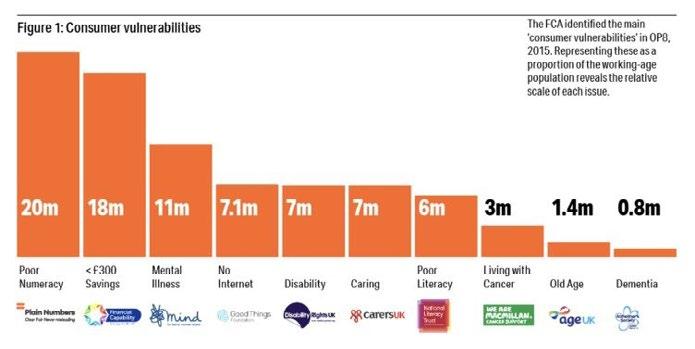
Evidence that a Plain Numbers Approach works
Established in 2021, Plain Numbers works with firms to ensure the clear communication of numbers, helping with customer comprehension, informed decisions, and positive outcomes. Our research has revealed the potential effect of applying the Plain Numbers Approach to communications. The graph below displays the results of Randomised Control Trials testing existing communications and Plain Numbers versions:
Improvement in comprehension using the Plain Numbers Approach
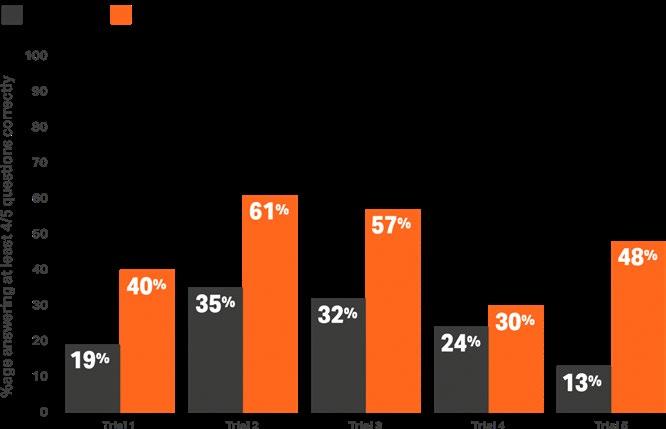
The headline finding from these trials is that, on average, the number of customers who understood the communications doubled . We have continued to observe excellent results from our Partners who have applied the Plain Numbers Approach through their own testing methods and have seen that the Approach works across all sectors and types of communication.

Becoming a Plain Numbers Partner
We are delighted to be working with a growing number of forward-thinking Plain Numbers Partners and are keen to collaborate with all firms that are interested in improving customer understanding. Our multi-year partnerships give communication professionals the necessary skills to communicate numbers more clearly, and with unlimited support from us, enable meaningful changes to their organisations’ communications.
If you are interested in working together to make sure that your enforcement communications enable recipients to make informed decisions and navigate the complexities of debt with confidence, then contact us to find out more.
Mike Ellicock Chief Executive Plain Numbers
19 CIVEA Civil Enforcement Association • Spring 2024 • ENFORCEMENT NEWS
Understanding economic abuse
Economic abuse, a coercive control tactic typically exercised by intimate partners, entails restricting access to economic resources, leaving victims dependent on their abusers for financial support. This form of abuse encompasses unauthorised use of property, money, or valuables, ultimately controlling the victim and exploiting their economic resources.
Economic abuse is illegal and is subject to the Domestic Abuse Act 2021 . An umbrella term, this includes any behaviour that has a substantial and adverse effect upon a person’s ability to acquire, use or maintain money, property, goods or services, which negatively impacts a victim’s economic security and self-sufficiency.
The consequences of economic abuse extend beyond financial constraints, impacting mental and physical health, access to education, parent-child interactions and overall quality of life.
Forms of abuse include but are not limited to, physical abuse, psychological or emotional abuse, coercive control, financial and economic abuse, sexual abuse and tech abuse.
Economic abuse transcends physical limits and is unique in that it can be perpetrated with little or no physical contact with the victim. Technology has enabled perpetrators to implement an extensive range of control tactics remotely, making it increasingly difficult to end this form of abuse, even post-relationship separation. Credit damage caused by economic abuse tactics, such as coerced debts, limits the victim’s economic resources and their potential for available credit, keeping them trapped in abusive relationships and a continued risk of physical violence.
The ramifications of economic abuse extend to mental health, contributing to depression, low self-esteem, psychosocial and psychological issues and even suicide attempts. Mothers

experiencing economic abuse are statistically more likely to face criminal charges. Children within economically abusive households are at greater risk of delinquency and bullying, impacting their overall development.
The aftermath of economic abuse lingers, hindering victims’ financial security, recovery, and independence. Interference with education and employment exacerbates difficulties in finding or maintaining a job. Post-separation, abusers may exploit family law and child support to perpetuate control, leaving victims burdened with debts and struggling to secure housing or meet living costs. This can leave some people staying with an abusive partner longer than they would like and experience more harm.
Identifying economic abuse can be challenging, but certain signs may be indicative during interviews. These include a reluctance to discuss finances, delegating financial matters to the partner, an inability to explain where surplus income goes or expressing difficulty in receiving mail. Physical abuse indicators, such as bruising or implausible explanations for injuries, may also signal economic abuse.
Victims of economic abuse can get advice and support services from Victims of Financial Abuse (0808 196 8845) or National Domestic Abuse (0808 2000 247).
 David Grimes Group Head of Training and Development, Excel Civil Enforcement Ltd
David Grimes Group Head of Training and Development, Excel Civil Enforcement Ltd
Fast,fairandeffectiveenforcement:
Counciltax,businessrates,arrestwarrants,parkingandtrafficmanagement
HighCourtenforcementfortherecoveryofmoneyjudgmentsandproperty/land
100%employedandfullyqualifiedenforcementagents
Forthebestoutcomes,getintouchtoday.
20 ENFORCEMENT NEWS • Spring 2024 • CIVEA Civil Enforcement Association
Award-winningnationwide enforcementforlocalauthorities
Contacttheexpertson 03303639988 www.excelenforcement.co.uk
Economic abuse – what is it and how can your organisation support victim-survivors
What is economic abuse?
Economic abuse involves behaviours that interfere with an individual’s ability to acquire, use and maintain economic resources such as money, housing and utilities. It can be controlling or coercive. It can make the individual economically dependent on the abuser, limiting their ability to escape and access safety1. It is designed to intimidate and isolate the victim2. The Domestic Abuse Act 2021 gave us the first statutory definition of domestic abuse, including economic abuse. It goes beyond interfering with money and finances to include economic resources.
Coercive control does not always involve the use of physical violence. Abusers use the threat of force or dictate the victim-survivor’s choices, controlling their everyday actions and becoming violent if their demands are refused. Forcing or coercing someone into debt is a common form of economic abuse – this is called coerced debt.
The behaviours that an abuser would use are:
Restriction: the abuser insists on seeing receipts or running through bank statements line-by-line, making the victim-survivor ask to use utilities, the car, a mobile phone etc.
Exploitation: the abuser pawns/sells the victim-survivor belongings, stealing their savings, making them work but taking their wages, insisting all liabilities are in the victim-survivor’s name, refusing to contribute to household costs, and building up debts in the victimsurvivor’s name.
Sabotage: the abuser destroys belongings, prevents the victim-survivor from being in education or employment or limits their working hours, which can cause them to lose their job, refuses to let them claim benefits and refuses to let them access a bank account.
When trying to collect a debt economic abuse may be apparent (but not limited to) when an individual is:
• In debt because their abuser has built up debt in their name (for example, by taking out loans or credit cards in the individual’s name without their knowledge)
• Coerced into debt because the abuser has forced them to take out loans and credit cards.
• Unable to repay their debt because an abuser takes their earnings, including wages and benefits
• Unable to repay debt because an abuser controls when and how their money is spent
• Unable to access specific debt recovery mechanisms because their abuser refuses to allow them to claim benefits or withholds financial information
• Struggling to communicate their financial position because an abuser controls their use of property, such as a mobile phone or car
• Victim to an abuser putting bills in their name and then not paying them or not giving the individual money to pay them.
These are all a form of coerced debt. Even when a victim-survivor has left the home, financial control can still be exerted, for example in regards to child maintenance. Abusers may be carers as well as family members or intimate partners. It is important to remember that economic abuse seldom happens in isolation – in most cases abusers use other abusive behaviours to reinforce it.
Prevalence
• One in five women experience domestic abuse
• 95% of those who experience domestic abuse will experience economic abuse3
• Those who experience economic abuse are five times more likely to experience physical abuse and are at increased risk of being killed4
• 25% of those experiencing economic abuse continue to experience it after leaving the abuser5
Money Advice Plus (MAP) pioneered the first national specialist, dedicated debt and money advice and casework service for victimsurvivors of domestic abuse in 2011. Since this point, MAP and its Financial Support Line for Victims of Domestic have supported more than 5,500 victim-survivors, achieving financial outcomes of more than £11 million.
Current data from the Financial Support Line casework service shows:
• 60% have experienced at least one form of coerced debt
• The average amount of debt owed is £28,000
• On average those supported have 7 debts
• Average individual debt is £4,000
• 68% have a priority debt
• 56% have a public sector debt.
The service can also see the impact of the cost-of-living on those supported as 47% have a negative budget and 91% have less than £100 surplus each month. This is an increase of 46% and 67% since October 2022. Not being able to access £100 on short notice is significant, as those who can’t access this at short notice are 3.5 times more likely to experience domestic abuse6
MAP devised and, with support from Surviving Economic Abuse (SEA), developed the Economic Abuse Evidence Form (EAEF) to respond to the needs of victim-survivors who have debts with multiple creditors across different sectors. The EAEF is an information-sharing tool providing a single mechanism through which a money/debt adviser can tell an organisation that their customer has experienced economic abuse.
The EAEF ensures victim-survivors only need to tell their story once. The form supports firms in implementing consumer duty by avoiding foreseeable harm. The pilot of the EAEF shows it protects both the victim-survivor from the harm caused by having to repeat their story, as well as colleagues in financial services firms from the 2nd trauma of having to listen to detailed descriptions of abuse. It is also leading to:
• Faster decision-making
• Reducing the need for the creditor to ask for secondary information.
Supporting you to support your customers of economic abuse
To have the best outcome for victim-survivors we need a joined-up approach between creditors sectors. While each organisation can deal with one debt owed to them, if your customer has six more debts with six different creditors, supporting your customer with the debt owed to you does not provide a solution to allow the victim-survivor to regain economic independence or security.
To become part of the joined-up approach, MAP and SEA can provide training to your colleagues, a chance to join the rollout of the EAEF and a bespoke referral service for your customers into the Financial Support Line for Victims of Domestic Abuse. For further information please contact karen.perrier@moneyadviceplus.org.uk
1. Home Office (2022), Statutory definition of domestic abuse factsheet
2. Surviving Economic Abuse, Am I experiencing economic abuse?, accessed: 06/06/2022
3. https://survivingeconomicabuse.org/what-we-do/research-and-evidence/ economic-justice-project/
4. Websdale, 1999
5. https://survivingeconomicabuse.org/wp-content/uploads/2020/11/SEACoerced-Debt-Statistics-08-2020-Final-1.pdf
6. Walby S 2004
 Karen Perrier Chief Executive Money Advice Plus
Karen Perrier Chief Executive Money Advice Plus
21 CIVEA Civil Enforcement Association • Spring 2024 • ENFORCEMENT NEWS
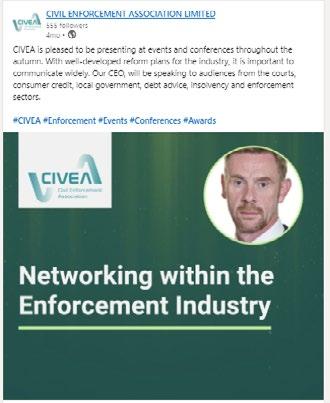
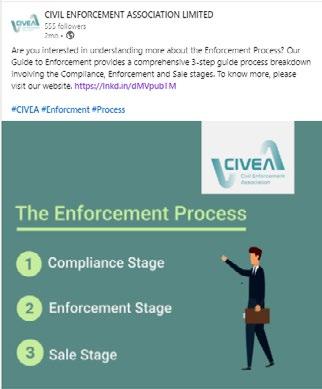



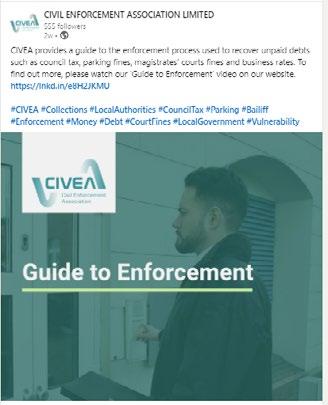
DO YOU FOLLOW OUR CIVEA LinkedIn PROFILE? Follow us to see our latest official: • press releases • government news updates • website blogs ...where we discuss industry topics and updates from the enforcement industry. Our regularly released blogs focus on key topics being discussed in the enforcement industry from updates from the Ministry of Justice to Government enforcement updates and regulations. LinkedIn: www.linkedin.com/company/ civil-enforcement-association-limited Website: www.civea.co.uk/ CIVEA PO Box 745 WAKEFIELD WF1 9RJ Email: admin@civea.co.uk Telephone: 0844 893 3922 Ethical & Efficient Enough Said t: 01792 645544 e: enquiries@ajenforce.co.uk w: www.ajenforce.co.uk










 Paul Whyte President, CIVEA
Paul Whyte President, CIVEA















 Tracy McAvoy Marketing & Operations Director Destin Solutions
Tracy McAvoy Marketing & Operations Director Destin Solutions












 Chris Nichols Chief Executive Enforcement Conduct Board
Chris Nichols Chief Executive Enforcement Conduct Board





 David Grimes Group Head of Training and Development, Excel Civil Enforcement Ltd
David Grimes Group Head of Training and Development, Excel Civil Enforcement Ltd
 Karen Perrier Chief Executive Money Advice Plus
Karen Perrier Chief Executive Money Advice Plus





